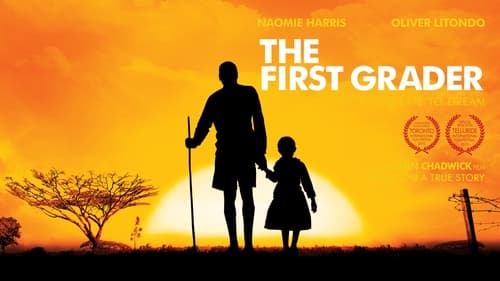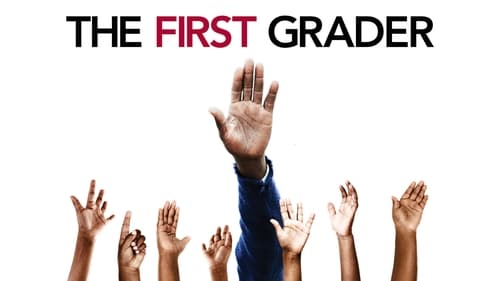ThiefHott
Too much of everything
WasAnnon
Slow pace in the most part of the movie.
Smartorhypo
Highly Overrated But Still Good
Lucia Ayala
It's simply great fun, a winsome film and an occasionally over-the-top luxury fantasy that never flags.
bewan87
The first grader is a true story about an 84 year old Kimani Maruge (Oliver Litondo) who decides to go back to school after learning that the Kenyan government has introduced free education. He was a MauMau soldier a fact that prevented him from getting an education he so desired due to the war. He goes back to school so he can learn how to read the bible and a letter he received. This decision takes him on a journey full of struggles, which he has to overcome. The head teacher Jane Obinchu (Naomi Harris) undergoes the struggles with Maruge, which rocks her marriage and also gets her transferred to another school. The movie's theme is the struggle a person undergoes when attempting to accomplish his or her goals. The movie's plot combined with good acting from Oliver Litondo and Naomi Harris shows his journey and struggles. Maruge and Obinchu fight the parents, villagers, education board, and teachers that are against his going back to school as they see do not see the reason why an old man about to die needs education. To them this is a waste of the schools scarce resources. Conviction, a movie about Carl Upchurch, a felon who turns his life around while in prison by getting an education and discovering his identity has a similar theme to that of the First Grader. In his mission to help out people who are in the same situation he was in he faces a lot of opposition and mockery from people due to his past, but never gives up hope. The first grader uses low-key lighting to create a somber mood and especially when Maruge has flashbacks of his days in the forest as a MauMau soldier and the torture he endured. The movie also uses high-key lighting with the difference between light and dark areas being wide thus creating powerful dramatic images. The movie also employs motifs, which is in form of Marugue's struggle and journey. The flashbacks about Maruge's days as a MauMau veteran and the suffering he and others endured in order to help Kenya achieve its independence is the motif that reflects the movies theme. In the movie, Maruge is suffering and is also being ridiculed by other due to his decision to get an education. The first grader is an inspirational story that takes the viewer through the struggle of a man to achieve his goal of learning how to read so he can understand the bible and a letter he received.
Linent
First, let me say this was a very engrossing tale. It's very difficult not to be sympathetic to the lead character, an 84-year old man who wants a basic education. But my antenna went up about 1/4 of the way into the movie when they start exploring the main characters Mau-Mau past. Wasn't Barak Obama's grandfather a Mau-Mau? Why yes! I believe he was! Then about 3/4 of the way through the movie my BS alert went into overdrive when one of the "extras" excitedly mentions Michelle Obama. And I finally realized, at the end, when another tangential character (stolen from the movie "Vanishing Point; Cleavon Little's "Super Soul") asks, "What's next? A black man in the White House?" Remember -- this movie was made two full years after there WAS a black man in the White House. So there was no predicting here; just celebrating. And the point of the movie? You be the judge. But I'm guessing it was a lot less about the on-screen story than the selling of an off-screen one. Just my opinion, of course. Just remember, the movie was a production of the propaganda department - the BBC - of a socialist government.
roguegrafix
This is a very good movie which operates at various levels. Ostensibly about an 84 year-old man going to primary school for the first time, it also covers (in graphic detail) a dark period in Kenya's and Britain's past: The Mau Mau Rebellion.The issues raised are complex: the right for an old man to an education even if it excludes another child in a country of stretched educational resources; the fight for freedom and the integrity of an oath; and the battle against officialdom are but a few. Above all, it's a struggle against adversity on a variety of levels, both past and present.The Mau Mau Rebellion is often overlooked in histories outside Kenya and this is well portrayed in the film. At times it is frightening and certainly very threatening and the director contrasts the flashbacks of the past with those of the present.The acting, cinematography, editing are excellent. As is the beautiful yet unobtrusive soundtrack. And even though it becomes a tad clichéd, it is still an impressive and inspiring story. I was very moved by it—not least the dignity of the old man given all the injustices he suffered. Certainly worth a watch and better than a lot of movies I have seen this year.
FilmRap
We take for granted that everyone in this country is entitled to an education. We especially can appreciate it when we see it through the eyes of eager children trying to learn the their ABCs in a dusty one room class room in Kenya where the government has decreed, for the first time, the right of everyone to be educated. We are taken to a new level of appreciation when we see it from the point of view of an 85 year old man Kimani Ng'ang'a Maruge (Oliver Musila Litondo) who is determined to join this class and get the education he never had and learn to read. This is based a true story of a man who became a national hero in Kenya and a symbol of the universal desire for education as his quest ultimately brought the real Maruge from his country village to address the United Nations. However important this theme may be, there also was another story going on here. This proud man had been part of Kikuyu tribe, which produced the Mau-Mau rebellion, which ultimately led to the Kenyan independence from British colonial rule. He demands and gets the respect as others realize that he had been one of freedom fighters who took a sacred oath to return the land controlled by the British back to the native people. As a young man he endured torture and witnessed the death of his wife and children at the hands of the British who demanded that he give up his oath of resistance. The movie flashes back from the present day of this old man trying to learn to read to when he was resisting the powerful British. This is a poignant and dramatic story about a piece of history that most of us do not know much about. It is based on screenplay by Ann Peacock but carried forth and molded by director Justin Chadwick. It is all the more remarkable because it paints an extremely negative picture of colonial Britain by this British Director with the initial support of the BBC, which took the project into development. The school children and most of the characters were not professional actors but all real life Kenyan people. This included the children and their school, which was quite genuine. The exception was Naomie Harris an outstanding English screen actress who had a major role-playing Jane Obinchu the schoolteacher who believed Maruge deserved the opportunity to learn to read. The performance by Litondo as Maruge is totally believable, as he seems to embody this "Mandelaisk" persona. Litondo is a native Kenyan who used to be a news anchor with no previous acting experience. Harris, Chadwick and their entire crew spent several weeks in Kenya working with locals and preparing to shoot this movie there. The result is an extremely, sensitive effective and emotional film. A middle school teacher in our audience mentioned how she was inspired to go back into her classroom and we all could feel the awe and the thirst for learning that young people and a deprived older man might feel. We also have had our interest peaked to learn more about this very interesting and complicated piece of African history about which this story only scratched the surface. It is a movie that should not be missed. (2011)



